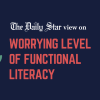Fix our dismal literacy rate

We are utterly disappointed at the slow progress made over the last three decades to eradicate the scourge of illiteracy from the country. Reportedly, one in four individuals is still illiterate in Bangladesh, despite the fact that projects worth at least Tk 4,232 crore have been undertaken by successive governments since 1991 to wipe out illiteracy. According to the Bangladesh Sample Vital Statistics 2022 of the Bangladesh Bureau of Statistics (BBS), at present, 76.8 percent of Bangladeshis aged seven and above are literate, while the rate is 74.4 percent among those aged 15 and above. While this may be considered significant progress if we compare it with the literacy rate in 1991 – only 35.3 percent among people aged 15 and above – we are still lagging far behind our goal of reaching 100 percent literacy by 2030.
Reportedly, the Bureau of Non-Formal Education (BNFE), the authority of non-formal education in the country, implemented nine projects over the last 30 years, while one project is still in progress. But educationists have pointed out that these schemes have not been able to get us the desired results due to a lack of proper approach towards the issue. According to them, the projects that the authorities undertook were narrow-focused, instead of being holistic. Experts say literacy can be attained in two ways: through formal education and through adult literacy projects. Our focus, however, has always been on formal education, with adult literacy getting less priority. And the projects aimed at providing non-formal education to primary school dropouts and children who never went to school were not very successful either, as those were mostly based on theoretical knowledge. Reportedly, the beneficiaries of these projects soon forgot what they had learnt and could hardly sustain their literacy skills.
Now, the question is, how should the authorities proceed to reach the target of 100 percent literacy by 2030? Experts suggest that taking a comprehensive approach – giving non-formal adult education more importance – is the key. While the authorities must increase their monitoring of the ongoing project, they should also make sure that future projects are more streamlined with effective measures, and there is better coordination among these projects. Checking the allegations of irregularities in the projects is also crucial. And since poverty still remains the biggest barrier to our literacy attainment – which was made worse by the Covid-19 pandemic – authorities should consider providing financial and other incentives to poverty-ridden families, particularly in vulnerable communities, to encourage them to participate in literacy projects.
Follow The Daily Star Opinion on Facebook for the latest opinions, commentaries and analyses by experts and professionals. To contribute your article or letter to The Daily Star Opinion, see our guidelines for submission.


 For all latest news, follow The Daily Star's Google News channel.
For all latest news, follow The Daily Star's Google News channel. 







Comments